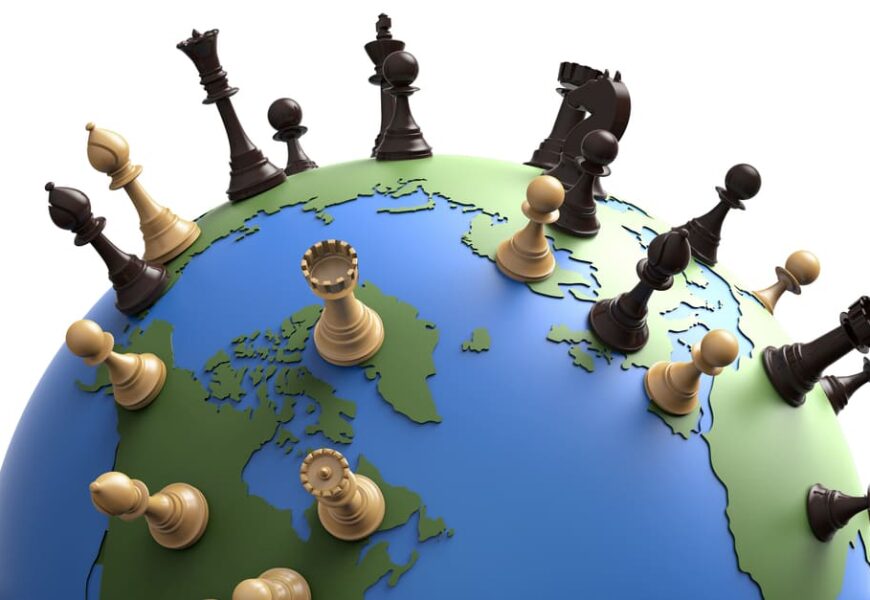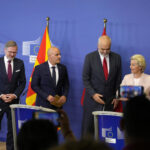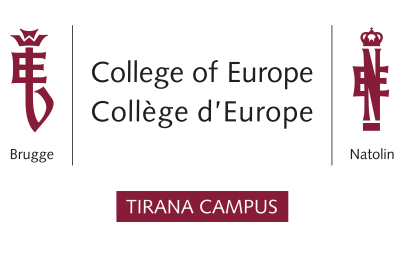by Veton Surroi [1]
The Western Balkans are now joined by Ukraine and Moldova to follow together the race between geopolitics and cynicism
The Thessaloniki Declaration in 2003 (adopted at the first EU-Western Balkan Summit) stated that the future of the Western Balkans is in the European Union. The 2023 version of the Declaration of Athens, in honor of that of Thessaloniki, approved last night, ( August 21st, 2023) [2] says that the future of the Western Balkans is in the European Union, and that Ukraine and Moldova have the same future.
The original declaration, that of 2003, was an EU effort to establish a strategic orientation for the Western Balkans, an agreement between the member states and the states of the Western Balkans (including Kosovo under the administration of UNMIK).
Last night’s Athens declaration is an attempt to create a strategic orientation of the EU for the Western Balkans together with Ukraine and Moldova.
And, at this point, that the EU has or will have a strategic orientation, the good news ends. In a match with reality, Ukraine and Moldova have now joined a European race between geopolitics and cynicism. In that race, the first thing that can come to mind is the next fatalistic barsoleta that in 2043 the summit of the leaders of the Western Balkans, Ukraine and Moldova will be held in Greece, and the prime minister of Georgia will also be a guest in it (and if will use a little imagination, Azerbaijan) with which the European future of the Western Balkans, Ukraine, Moldova, and now also Georgia (and, with a little imagination, Azerbaijan) will be re-declared.
Geopolitics has its place both in 2003 and in 2023
In 2003, the wars of the former Yugoslavia had ended (the last one of R. Macedonia in 2001), the USA was busy in the wars of Afghanistan and Iraq, and the EU had the right vision that the stabilization of Europe means EU membership of space of its southeast (and that for this we should not wait for the American geopolitical return).
In 2023, Russia’s war against Ukraine gives an additional dimension to the vision of the EU, the definition of its eastern borders with the implication of the inclusion of the Western Balkans within the entirety of the European Union. And, while the EU has been established for the first time as a power that actively helps the war on the European continent, together with the USA, the decision on the membership of Ukraine and Moldova, as a permanent stabilization measure, belongs to the EU.
The problem of the EU’s geopolitical approach is the mismatch between the objectives and the capacity to achieve them. After the 2003 Summit, only Croatia joined the EU; all other participants have the promise of membership and candidate status (with the exception of Kosovo). But being a candidate for membership has not changed the relationship in the triangle of unfinished states Kosovo-Serbia-BH. Moreover, another candidate state, Montenegro, has suffered a major blow on its European path from identity friction, a significant part of which comes from the other candidate state, Serbia.
In 2023, the establishment of Ukraine as a geopolitical turning point, which should speed up the EU’s preparation for this great historical challenge that will define the border between Europe and Euro-Asia, is the right vision, but if I were in Kiev I would I analyzed Kosovo-Serbia relations and the EU’s mediation. For more than ten years, the EU has not reached an agreement on an issue in its own backyard. If it cannot reach an agreement with its own instruments on a secondary (or third-order) issue compared to the eastern crises, what can be expected of it in Ukraine or Moldova?
Geopolitics, therefore, was not enough
Yes, there was a period when geostrategic decisions were made. The accession of Spain, Portugal and Greece, newly emerged from dictatorships, were turning points for the peoples of those states and for the well-being of the continent as a whole. The membership of Romania and Bulgaria, both countries that, as seen today, are in the immediate neighborhood of the Ukraine war, also significantly stabilized this part of the continent. But why this happened then, does not mean that it should happen now.
Instead of geopolitics, cynicism has entered the race. In the Athens 2023 Declaration, a historic turning point is made of the union of the great cause (the freedom and independence of the European Ukraine) with the smaller causes (the integration of the Western Balkans). And, this statement is made right when the EU fulfilled the (next) anniversary of the inability to mediate: in September of last year Kosovo and Serbia were offered on a “take it or leave it” basis the most ambitious project so far, of a basic agreement between two independent states establishing relations without mutual recognition of citizenship. A year later, round after round of poor mediation, Kosovo and Serbia are further from the basic agreement than they were in September of last year.
And while the EU declares its geostrategic intention to help push Russia out of Ukraine, it does not prove it can do so in the Western Balkans: for a year and a half, Russia has remained just as strong, if not more so, right in the middle of the Balkans, in Serbia and Bosnia-Herzegovina.
The geopolitical ambition to create a free Europe with the Western Balkans in it and extending to the border between Ukraine and Russia, manifested last night in Athens, is the ambition for the most ambitious Euro-Atlantic project of this century. For the Western Balkans, this meant a democratic Serbia at peace with its neighbors, an independent Kosovo at peace with Serbia, a democratic and functional Bosnia-Herzegovina at peace with its identity pluralism, and so on. That all these countries have a common security system based on NATO.
Against this geopolitical ambition is the cynicism of reality. It is difficult to imagine that the EU will create a democratic space under the umbrella of NATO from the space of unfinished conflicts without the decisive intervention of the United States, Great Britain and powerful EU member states, primarily Germany, France, Italy and why not Poland.
The instruments shown so far in the Kosovo-Serbia case, from the discussions on license plates and territorial exchanges, to the great “geopolitical” victory of the EU achieved in Ohrid in what was called the Kosovo-Serbia Agreement, show that behind Big words hide small actions. What was called the Agreement was fragile with the very fact that it was not signed and is considered an Agreement, because this is what the head of diplomacy J. Borell considers to be. Even, with the greatest seriousness, it was explained how this is a legally binding Agreement, because “it is found in chapter 35 for Serbia and the SAA for Kosovo”, a wording that neither convinces, nor stimulates, nor scares.
This is the paradigm of the EU before the geopolitical challenge of the century.
[1] Veton Surroi is a Kosovar Albanian publicist, politician and former journalist. Surroi is the founder and former leader of the ORA political party, and was a member of Kosovo assembly from 2004 to 2008.
[2] The presidents of Serbia, Montenegro and Moldova, the prime ministers of North Macedonia, Kosovo, Bulgaria, Croatia and Romania, and the head of the council of ministers of Bosnia and Herzegovina were to attend the dinner, being hosted by Greek Prime Minister Mitsotakis on the 20th anniversary of a summit between the EU and western Balkan countries in the northern Greek city of Thessaloniki as Balkan states sought to join the European bloc.









